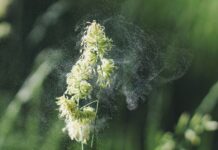Street artist James Cochran has created a 50,000-dot painting using a lab pipette – to illustrate pioneering new research at The Institute of Cancer Research, London
- Painting reflects challenge of overcoming cancer’s ability to evolve drug resistance and creativity needed for scientists to discover new treatments
- James Cochran, best known for his David Bowie mural in Brixton, spent more than 250 hours creating the painting with the same type of lab pipette used by scientists at The Institute of Cancer Research (ICR)
- The unique work of art is titled ‘Cell defence’ and shows the immune systems’ response against cancer – which is being exploited by new immunotherapies
- The ICR needs donations to finish and equip its Centre for Cancer Drug Discovery, which is taking a pioneering approach to outsmarting cancer including by marshalling the immune system. Support and donations are particularly important in this time as cancer research has been on hold during the coronavirus crisis: ICR.ac.uk/painting
A unique painting created using a lab pipette and based upon real-life images of cancer research has been unveiled today (10 November). The intricate artwork is made of an estimated 50,000 small dots of paint, each hand-dispensed from a laboratory pipette, the type used by scientists conducting pioneering research into cancer. The painting is inspired by an image of a patient’s immune system responding to a tumour and was created by renowned street artist James Cochran, also known as Jimmy C, for The Institute of Cancer Research, London.
James Cochran spent more than 250 hours painstakingly applying 1cm droplets of paint from a lab pipette to a canvas. The artist, who is best known for his mural of David Bowie in Brixton, has previously suffered from a type of skin cancer known as a basal cell carcinoma.
Titled Cell Defence, the 1.25m x 1.25m painting is in a pointillism style and is inspired by an image of liver cancer cells taken through a microscope by scientists at The Institute of Cancer Research (ICR). The image shows how the body’s own immune system responds to the cancer cells to try and keep cancer’s ability to adapt and evolve in check.
Strategies to harness the immune response against cancer are a key part of the ICR’s pioneering research to overcome the disease’s ability to evolve resistance to drugs. James’s 50,000-dot work symbolises the complexities of cancer evolution research and the creativity and commitment needed by the ICR’s scientists to stay one step ahead of cancer.
The ICR’s pioneering cancer evolution research will take place at its new Centre for Cancer Drug Discovery, which opens later this month. After a period of time where cancer research was on hold due to the coronavirus crisis, ICR scientists are now back in their labs and this building will see around 300 evolutionary biologists and drug discovery scientists come together to lead an unprecedented ‘Darwinian’ drug discovery programme. This research programme aims to overcome cancer’s ability to evolve resistance to drugs and ‘herd’ it into more treatable forms, in order to turn cancer into a manageable disease that can be controlled in the long term and effectively cured.
The building is about to be officially opened, but the ICR still needs additional donations to equip the building so their scientists can start their urgent work to discover new strategies t defeat cancer. To donate to the new Centre for Cancer Drug Discovery, visit the page here: ICR.ac.uk/painting
Professor Sir Mel Greaves, Founding Director of Cancer Evolution in the Centre for Cancer Drug Discovery, said:
“By using a lab pipette as his brush and basing the painting on the ICR’s research into cancer evolution, James’s piece does a wonderful job of capturing the blend of creativity and rigorous science that our researchers use every day to outsmart cancer. That said, during the coronavirus crisis our research has been on hold but of course, cancer has not. We have lost vital time in our research to defeat cancer and need support today to help us make up for lost time in defeating this disease. Many cancer patients are more vulnerable than ever– so the need to understand cancer better and design smarter, kinder and more effective treatments has become even more urgent. Thankfully the opening of our new Centre for Cancer Drug Discovery will help with this and this painting is a symbol of that endeavour and hope.
It will be a huge honour for us to have James’s unique work of art displayed in our state-of-the-art building, which will have computational scientists, mathematicians, clinicians, evolutionary biologists, and drug discovery researchers all working hand in hand in an unprecedented way to find new treatments that can overcome cancer evolution and drug resistance.”
Artist James Cochran said:
“I’m used to using cans of spray paint in my art, so swapping that for a lab pipette was quite challenging – but also very rewarding. The process of slowly building up the painting dot by dot and the inspiration for the piece gave me a better understanding of the challenges involved in finishing cancer and the inventiveness needed by scientists to do that. I’ve had a number of treatments for a type of skin cancer called a basal cell carcinoma and I’ve lost loved ones to the disease, so this commission was personal to me. The work the ICR is doing in tackling cancer’s ability to evolve resistance to drugs and treatments is so important, now during the coronavirus crisis, more than ever and I really wanted to reflect their efforts in this painting.”
The unique pipette painting will be displayed permanently in the ICR’s Centre for Cancer Drug Discovery, where scientists will pass it every day as they work on discovering new drugs that can finish cancer. The Centre will be opening on 17 November 2020.
Help keep news FREE for our readers
Supporting your local community newspaper/online news outlet is crucial now more than ever. If you believe in independent journalism, then consider making a valuable contribution by making a one-time or monthly donation. We operate in rural areas where providing unbiased news can be challenging. Read More About Supporting The West Wales Chronicle























